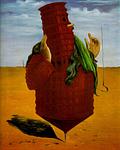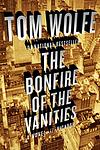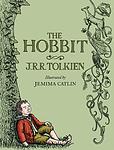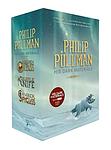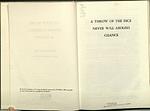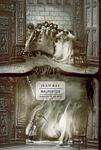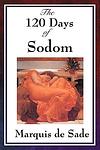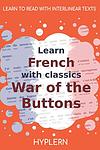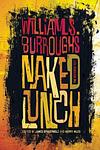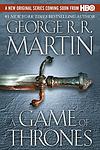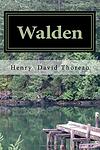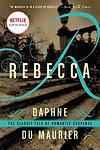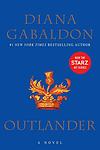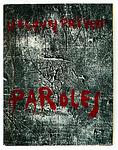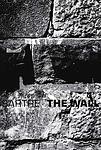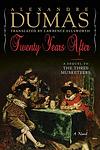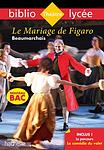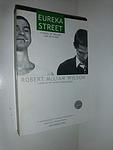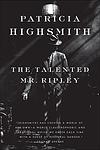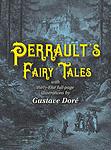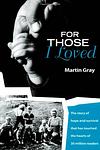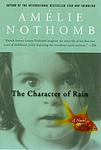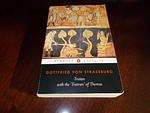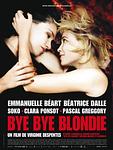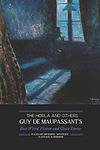The 500 best books of all time from Culture Café users
This is one of the 300 lists we use to generate our main The Greatest Books list.
-
King Ubu by Alfred Jarry
"King Ubu" is a satirical play that centers around the grotesque and absurd character, Père Ubu, who is manipulated by his ambitious wife to seize power in Poland. Once king, Ubu's reign is marked by greed, cruelty, and incompetence, leading to chaos and violence. The play employs absurdity and farce to critique power and corruption, using exaggerated characters and surreal scenarios to highlight the folly and destructiveness of tyrannical rule. This pioneering work is often considered a precursor to the Theatre of the Absurd and has had a lasting influence on avant-garde theatre.
The 1725th Greatest Book of All Time -
The Giver by Lois Lowry
The book is set in a seemingly perfect community without war, pain, suffering, differences or choice, where everything is under control. The protagonist is chosen to learn from an elderly man about the true pain and pleasure of the "real" world. He discovers the dark secrets behind his fragile community and struggles to handle the burden of the knowledge of pain and the concept of individuality. He must decide whether to accept the status quo or break free, risking everything.
The 595th Greatest Book of All Time -
Erections, Ejaculations, Exhibitions, And General Tales Of Ordinary Madness by Charles Bukowski
This book is a collection of short stories that delve into the gritty and often sordid aspects of human experience, focusing on the lives of the downtrodden and the outcasts of society. The narrative voice is raw and unfiltered, presenting a world filled with alcohol, sex, and existential despair, where characters navigate through the chaos of urban life. The stories are marked by a sense of realism and dark humor, offering an unapologetic exploration of the human condition and the madness that can be found in the ordinary lives of individuals.
The 5224th Greatest Book of All Time -
Nostromo by Joseph Conrad
Set in the fictional South American country of Costaguana, the novel explores the turbulent political and social changes of the era through the eyes of Nostromo, a respected and resourceful Italian expatriate. Nostromo's loyalty and heroism are tested when he is tasked with hiding a cache of silver from a revolutionary government. As the political landscape shifts, he finds himself caught in a web of moral dilemmas and life-altering decisions. The novel is a profound examination of power, corruption, and the human condition.
The 194th Greatest Book of All Time -
Bonfire of the Vanities by Tom Wolfe
This novel follows the life of a successful Wall Street bond trader who, after a wrong turn in the Bronx, finds his life spiraling out of control. After a hit-and-run accident in a predominantly black neighborhood, he becomes the target of a political witch hunt, exacerbating racial tensions in the city. As the protagonist's world unravels, the story provides a satirical commentary on 1980s New York City, exploring themes of racism, classism, politics, and greed.
The 250th Greatest Book of All Time -
La Dernière Harde by Maurice Genevoix
The book is a poignant narrative that delves into the life of a deer herd in the forests of Sologne, France. Through the changing seasons, the story follows the herd's struggles for survival against natural elements, hunters, and the encroachment of civilization. The author masterfully portrays the beauty and brutality of nature, as well as the complex relationships within the herd, led by their majestic leader. The novel is a reflection on the themes of life, death, and the relentless cycle of nature, offering a rich exploration of the animal psyche and the impact of human activity on wildlife.
The 5225th Greatest Book of All Time -
Sarah's Key by Tatiana de Rosnay
The novel intertwines two stories: one of a young Jewish girl named Sarah, who is brutally arrested with her family during the Vel' d'Hiv Roundup in 1942 Paris, and the other of an American journalist, Julia, living in contemporary France. As Julia investigates the roundup's history for an article, she uncovers the harrowing tale of Sarah, who locked her younger brother in a cupboard to protect him from the police, promising to return. The narrative reveals the impact of this historical event on Sarah's life and connects it to Julia's own family history, leading to profound revelations that change Julia's life. The book explores the themes of memory, guilt, and the legacy of the Holocaust.
The 8301st Greatest Book of All Time -
Chronicle of a Death Foretold by Gabriel Garcia Marquez
The novel unfolds as a murder mystery, revealing the planned revenge killing of a young man named Santiago Nasar by the Vicario brothers. They believe Santiago has dishonored their sister, Angela, by taking her virginity before her marriage to another man. Despite the impending murder being common knowledge within the small Colombian town, a series of coincidences and misunderstandings prevent anyone from intervening, leading to Santiago's tragic and foretold demise. The narrative explores themes of honor, fate, and the collective responsibility of a community.
The 986th Greatest Book of All Time -
The Hobbit by J. R. R. Tolkien
In this fantasy novel, a timid and unadventurous hobbit named Bilbo Baggins is whisked away on a grand adventure by a wizard and a group of dwarves. Their mission is to reclaim the dwarves' homeland and treasure from a fearsome dragon. Throughout the journey, Bilbo grows in courage and cunning, proving himself a true hero as he encounters trolls, goblins, giant spiders, and other perils. The novel culminates with a great battle involving various races of Middle Earth, after which Bilbo returns home, forever changed by his experiences.
The 185th Greatest Book of All Time -
His Dark Materials by Philip Pullman
"His Dark Materials" is a fantasy trilogy that follows the journey of a young girl named Lyra Belacqua and her daemon, Pantalaimon, across parallel universes. Throughout their adventures, they encounter a variety of mythical creatures, confront religious and political systems, and grapple with complex themes such as free will, original sin, and the nature of consciousness. The series also delves into the mysteries of Dust, a strange particle integral to the multiverse's function.
The 342nd Greatest Book of All Time -
Hygiene And The Assassin by Amélie Nothomb
The book revolves around the final days of a Nobel Prize-winning author who, after being diagnosed with a terminal illness, agrees to a series of interviews having shunned public attention for decades. Known for his misanthropy and biting intellect, the author engages in verbal sparring with the journalists, each encounter more intense than the last. However, when a particularly astute and persistent female journalist enters the fray, the conversation takes an unexpected turn, leading to startling revelations about the author's past and the true nature of his controversial works. The narrative delves into themes of truth, deception, and the power dynamics inherent in the creation and interpretation of literature.
The 6557th Greatest Book of All Time -
The Immortals by René Barjavel
"The Immortals" is a science fiction novel that explores the consequences of a groundbreaking discovery: a serum that grants eternal youth. As the serum becomes a coveted resource, it drastically alters society, leading to a chasm between the immortal elite and the aging population. The narrative delves into themes of power, inequality, and the ethical dilemmas of immortality, while following the lives of those who seek to control the serum and those who are affected by its existence. The story raises profound questions about the nature of life, death, and the true cost of eternal life.
The 5226th Greatest Book of All Time -
My Name is Red by Orhan Pamuk
Set in the late 16th century Ottoman Empire, this novel explores the conflict between East and West, tradition and innovation, through the lens of miniaturist painters. When a renowned artist is murdered, his colleagues must solve the mystery while grappling with the changes in their art brought about by the western Renaissance. This complex narrative intertwines love, art, religion, and power, offering a deep exploration of the struggles between old and new.
The 747th Greatest Book of All Time -
Species Of Spaces And Other Pieces by Georges Perec
This book is a collection of essays and musings that explore the concept of space in its myriad forms, from the intimate to the vast, the mundane to the conceptual. The author employs a variety of literary styles and devices to dissect the spaces we inhabit, such as the page upon which one writes, the bed one sleeps in, the apartment, the street, and the city. Through this examination, the work delves into themes of memory, absence, and the everyday, encouraging readers to perceive the spaces around them in new and thought-provoking ways. The text is both playful and philosophical, inviting a deeper reflection on the spaces we often take for granted and the ways in which they shape our experiences.
The 5227th Greatest Book of All Time -
Dead Poets Society by N.H. Kleinbaum
Set in the conservative and aristocratic Welton Academy in Vermont, the novel follows a group of students whose lives are transformed by a new English teacher with unorthodox teaching methods and a passion for poetry. The teacher inspires the students to seize the day and pursue their own dreams, challenging the rigid expectations set by the school and their parents. As the boys awaken to the power of individual expression and the beauty of following one's own path, they revive a secret club—the Dead Poets Society—where they explore literature and the idea of living life to its fullest. However, their newfound freedom comes with consequences, leading to a dramatic and poignant conclusion that underscores the cost of nonconformity in a traditional setting.
The 2919th Greatest Book of All Time -
The Diary of a Young Girl by Anne Frank
This book is a real-life account of a young Jewish girl hiding from the Nazis during World War II, written in diary format. The girl and her family are forced to live in a secret annex in Amsterdam for two years, during which she writes about her experiences, fears, dreams, and the onset of adolescence. The diary provides a poignant and deeply personal insight into the horrors of the Holocaust, making it a powerful testament to the human spirit.
The 62nd Greatest Book of All Time -
A Throw Of The Dice Will Never Abolish Chance by Stéphane Mallarmé
This book is a groundbreaking work of French poetry that challenges traditional literary forms and expectations. It presents a poem that is as much a visual art piece as it is a literary one, with text arranged in a variety of typefaces and layouts that spread across the pages in a way that defies conventional reading patterns. The poem delves into themes of fate, chance, and the elusive nature of meaning, using the metaphor of a shipwreck and the sea to explore the interplay between order and chaos. Its innovative use of space and typography invites readers to engage with the poem on multiple levels, making it a seminal work in the Symbolist movement and a precursor to modernist literature.
The 5228th Greatest Book of All Time -
Malpertuis by Jean Ray
"Malpertuis" is a gothic novel that weaves together the surreal and the macabre, telling the story of a mysterious and ancient house in Belgium that is as much a character as the people inhabiting it. The narrative unfolds through the eyes of a young man who becomes entangled in the enigmatic and often disturbing events within the walls of Malpertuis. As the story progresses, it becomes clear that the house is a labyrinthine trap for a pantheon of gods who have dwindled in power and are now imprisoned in mortal forms by the dying will of an old and cunning man. The novel blends mythology, horror, and philosophy, creating an unsettling and dreamlike atmosphere that questions the nature of reality and the gods' place in the modern world.
The 5229th Greatest Book of All Time -
Wilt by Tom Sharpe
The book is a satirical comedy that follows the life of Henry Wilt, a demoralized and downtrodden assistant lecturer of liberal studies at a technical college in England. Wilt struggles with his mundane life, his domineering wife Eva, and his dead-end job. His life takes a chaotic turn when a series of misunderstandings and unfortunate events, including a prank involving an inflatable doll, lead to a police investigation for murder. Wilt must navigate the absurdities of the social classes, the ineptitudes of the police force, and the eccentricities of his own life to clear his name in a world that seems to be conspiring against him. The novel is a humorous critique of British society, bureaucracy, and the education system in the 1970s.
The 5372nd Greatest Book of All Time -
What a Carve Up! by Jonathan Coe
This satirical novel follows the story of the Winshaw family, a wealthy and corrupt British family who have a significant influence on British society in fields such as politics, business, media, and the arts. The narrative is presented through the eyes of a commissioned biographer who is trying to make sense of the family's history and their impact on society. As he delves deeper into the family's affairs, he uncovers dark secrets and becomes entangled in a complex web of deceit and murder.
The 1185th Greatest Book of All Time -
The 120 Days of Sodom by Marquis de Sade
The book is an explicit and controversial work that explores themes of sexual perversion and cruelty. The narrative follows four wealthy, libertine men who lock themselves in a remote castle with a harem of 46 victims, including men, women, and children. Over the course of 120 days, they engage in a series of escalating debaucheries, meticulously documented by the men. The story is a study of the darkest corners of human nature, presenting an unflinching and graphic portrayal of sexual violence.
The 1701st Greatest Book of All Time -
The War Of The Buttons by Louis Pergaud
The book is a charming tale of rural French schoolboys from neighboring villages who engage in mock battles, with the ultimate trophy being the buttons and belts of their defeated opponents. This rivalry, filled with youthful pride and the desire to protect one's honor, escalates as the children strategize and skirmish, all while grappling with the themes of camaraderie, tradition, and the transition from innocence to adolescence. The narrative, rich with humor and the simplicity of country life, ultimately explores the universal aspects of growing up and the bittersweet nature of childhood conflicts.
The 5230th Greatest Book of All Time -
Ferdydurke by Witold Gombrowicz
"Ferdydurke" is a satirical novel that explores the themes of maturity, identity, and societal norms. The protagonist, a thirty-year-old writer, is forcibly regressed by two professors back to his adolescence and placed in a school setting. The narrative critiques the artificiality of adulthood and the pressure of societal expectations, while also exploring the struggle for self-expression and individuality. The book is known for its absurdist humor and its examination of the human condition.
The 401st Greatest Book of All Time -
Faust by Johann Wolfgang von Goethe
The book is a tragic play in two parts that tells the story of a scholarly man named Faust, who becomes dissatisfied with his life and makes a pact with the devil, Mephistopheles. In exchange for unlimited knowledge and worldly pleasures, Faust agrees to give his soul to Mephistopheles after death. The narrative explores themes of ambition, despair, love, and redemption, ultimately leading to Faust's salvation.
The 84th Greatest Book of All Time -
Rhinoceros and Other Plays by Eugène Ionesco
"Rhinoceros and Other Plays" is a collection of three absurdist dramas that explore themes of conformity, culture, and mass movements. The titular play depicts a small French town where the inhabitants inexplicably transform into rhinoceroses, symbolizing the rise of fascism and the dangers of conformity. The other two plays, "The Leader" and "The Future is in Eggs," continue to explore these themes through a satirical and often surreal lens, challenging societal norms and the nature of reality itself.
The 1724th Greatest Book of All Time -
Naked Lunch by William S. Burroughs
A controversial novel that explores the dark depths of drug addiction and societal decay, following the protagonist, a junkie, as he navigates through a series of surreal and grotesque scenarios. The narrative is nonlinear and disjointed, reflecting the protagonist's fragmented consciousness and the chaotic nature of addiction. The book is known for its graphic depictions of sex, violence, and drug use, and it challenges traditional notions of morality and narrative structure.
The 321st Greatest Book of All Time -
A Game of Thrones by George R. R. Martin
This epic fantasy novel is set in the Seven Kingdoms of Westeros, where 'summers span decades and winters can last a lifetime'. The story follows three main plot lines: the Stark family's struggle to control the North; the exiled Targaryen siblings' attempt to regain the throne; and the Night's Watch's fight against the supernatural beings beyond the Wall. As these stories intertwine, a game of power, politics, and survival unfolds, where you either win or you die.
The 560th Greatest Book of All Time -
The Prince of Tides by Pat Conroy
"The Prince of Tides" is a gripping narrative about a troubled man who must confront his traumatic past in order to help his twin sister, a poet who has attempted suicide. The protagonist, in the process of aiding his sister's psychiatrist, is forced to delve into their shared history of growing up in a dysfunctional family in South Carolina. The story is a deep exploration of family dynamics, mental health, and the enduring impact of childhood trauma, all set against the backdrop of the Southern United States.
The 1355th Greatest Book of All Time -
Walden by Henry David Thoreau
This work is a reflection upon simple living in natural surroundings, inspired by the author's two-year experience of living in a cabin near a woodland pond. Filled with philosophical insights, observations on nature, and declarations of independence from societal expectations, the book is a critique of the complexities of modern civilization and a call to appreciate the beauty and simplicity of the natural world. It explores themes such as self-reliance, solitude, and the individual's relationship with nature.
The 71st Greatest Book of All Time -
High Fidelity by Nick Hornby
This novel revolves around the life of a record store owner in his mid-thirties who is obsessed with pop culture, particularly music. He has just been dumped by his long-term girlfriend and begins to question his life choices. As he revisits his top five breakups, he decides to get in touch with the exes to find out what went wrong in each relationship. Throughout this process, he learns a lot about himself, his fears, and his shortcomings while trying to make sense of his life.
The 652nd Greatest Book of All Time -
The Bad Girl by Mario Vargas Llosa
The novel follows the life of Ricardo Somocurcio, a man from Lima, Peru, who becomes infatuated with a mysterious girl he meets in his youth. This girl, who constantly reinvents her identity, reappears throughout his life in various guises and names, leading him on a tumultuous and passionate journey that spans continents and decades. As Ricardo pursues a career as a translator and moves through different countries, he encounters the enigmatic woman in various circumstances, each time falling under her spell despite the pain and complexity she brings into his life. The story is a reflection on love, obsession, and the transformative power of relationships over time.
The 8302nd Greatest Book of All Time -
American Pastoral by Philip Roth
This novel tells the story of Seymour "Swede" Levov, a successful Jewish-American businessman and former high school athlete from Newark, New Jersey. Levov's happy and conventional upper middle class life is ruined by the domestic social and political turmoil of the 1960s during the presidency of Lyndon B. Johnson, which in the novel is seen through the eyes of the narrator, Nathan Zuckerman, a budding writer who idolizes the Levovs. The novel portrays the impact of this turmoil on Levov and his family, particularly his rebellious daughter who becomes involved in revolutionary political activities.
The 245th Greatest Book of All Time -
The Shining by Stephen King
A recovering alcoholic accepts a job as a winter caretaker at a remote Colorado hotel, hoping the isolation will help him reconnect with his wife and young son, and work on his writing. However, the hotel has a dark history and a powerful malevolent presence that influences him into violence, while his psychic son sees horrific forebodings from both past and future. As the winter weather leaves them snowbound, the father's sanity deteriorates, leading to a terrifying climax.
The 186th Greatest Book of All Time -
Dracula by Bram Stoker
This classic horror novel tells the story of Count Dracula's attempt to move from Transylvania to England so that he may find new blood and spread the undead curse, and of the battle between Dracula and a small group of people led by Professor Abraham Van Helsing. The narrative is composed of journal entries, letters, and telegrams written by the novel's protagonists, providing different perspectives on the gruesome events unfolding. The book touches on themes of sexuality, gender roles, and the clash of modern science with traditional superstition.
The 85th Greatest Book of All Time -
Vanity Fair by William Makepeace Thackeray
This classic novel follows the lives of two contrasting women, the cunning and ruthless Becky Sharp and the sweet and naive Amelia Sedley, against the backdrop of English society during the Napoleonic Wars. The book is a satirical exploration of the obsession with wealth, status, and social climbing, and the moral bankruptcy that can result from such pursuits. The narrative weaves an intricate tale of love, betrayal, and redemption, exposing the vanity and hypocrisy of high society.
The 72nd Greatest Book of All Time -
A Monkey In Winter by Antoine Blondin
The novel revolves around the unlikely friendship between two men, each struggling with their own demons and past glories, in a small French seaside town. The older of the two is a hotel owner with a penchant for storytelling and a history as a one-time artist, while the younger is a recovering alcoholic and former gymnast. Over the course of a winter, their camaraderie and shared penchant for escapism lead them on a series of adventures, both real and imagined, as they confront their failures and seek solace in each other's company, often blurring the lines between reality and fantasy. Their journey is a poignant exploration of human frailty, the power of friendship, and the enduring pursuit of dignity against the backdrop of a world that has moved on without them.
The 5231st Greatest Book of All Time -
Richard III by William Shakespeare
"Richard III" is a historical play that follows the Machiavellian rise to power and subsequent short reign of its titular character. Richard, Duke of Gloucester, is depicted as a ruthless, power-hungry man who will stop at nothing to take the throne of England, resorting to manipulation, deceit, and even murder. However, his reign is plagued by guilt and insecurity, and his tyranny eventually leads to his downfall and death in battle. The play explores themes of power, corruption, morality, and the consequences of unchecked ambition.
The 934th Greatest Book of All Time -
Rebecca by Daphne du Maurier
A young woman marries a wealthy widower and moves into his large English country house. She quickly realizes that the memory of her husband's first wife, Rebecca, haunts every corner of the estate. The housekeeper's obsessive devotion to Rebecca and the mysterious circumstances of her death continue to overshadow the second wife's attempts to make a happy life with her husband. As secrets about Rebecca's life and death are revealed, the new wife must grapple with her own identity and place within the household.
The 57th Greatest Book of All Time -
Poussières D'étoiles by Hubert Reeves
"Poussières d'étoiles" is a poetic exploration of the cosmos and our place within it, delving into the intricate connections between the universe and the microscopic elements that compose life on Earth. The book weaves together astronomy, physics, biology, and philosophy to illustrate how the atoms that make up our bodies were once part of ancient celestial phenomena. Through accessible language and engaging storytelling, the narrative takes readers on a journey from the Big Bang to the evolution of life, emphasizing the awe-inspiring reality that we are literally made of stardust, sharing a fundamental bond with the vast, dynamic universe around us.
The 6059th Greatest Book of All Time -
The Alexandria Quartet by Lawrence Durrell
"The Alexandria Quartet" is a tetralogy of novels that explore the intricate relationships between a group of friends and lovers in Alexandria, Egypt, before and during World War II. The novels are known for their rich and evocative descriptions of the city and its diverse inhabitants, as well as their innovative narrative structure, which presents the same events from different characters' perspectives in each book. The work explores themes of love, betrayal, and the nature of reality and perception.
The 443rd Greatest Book of All Time -
L'acacia by Claude Simon
The novel is a complex and fragmented exploration of memory and war, weaving together the personal and historical experiences of a soldier who, after surviving the battlefields of World War I, embarks on a journey to reclaim the body of his brother killed in action. As the narrative shifts across time and space, it delves into the soldier's recollections of his childhood, his experiences during the war, and the broader impacts of conflict on individuals and society. The book's non-linear structure and rich, descriptive language challenge the reader to piece together the story, reflecting the disorienting and enduring effects of war on the human psyche.
The 6393rd Greatest Book of All Time -
A Fine Balance by Rohinton Mistry
"A Fine Balance" is a poignant narrative set in India during the 1970s, a time of political turmoil and upheaval. The plot revolves around four diverse characters - a widow, a young student, and two tailors - who are brought together by fate. Through their interconnected lives, the book explores themes of caste, poverty, political corruption, and the human spirit's resilience. It offers a profound exploration of the delicate balance that sustains life amidst adversity.
The 397th Greatest Book of All Time -
Northanger Abbey by Jane Austen
"Northanger Abbey" is a coming-of-age novel that follows the story of Catherine Morland, a young and naive girl who is invited to stay with the wealthy Tilney family at their estate, Northanger Abbey. Catherine's imagination is fueled by her love for gothic novels, leading her to create fantastical scenarios in her mind. As she navigates the complexities of society and falls in love, Catherine learns valuable lessons about the dangers of letting her imagination run wild and the importance of distinguishing reality from fiction.
The 995th Greatest Book of All Time -
Echine by Philippe Djian
"Echine" is a novel that delves into the complexities of human relationships and the dark undercurrents of desire. Set against a backdrop of suspense, the narrative follows the life of a protagonist who becomes entangled in a web of passion, betrayal, and violence. As the story unfolds, the characters navigate through a series of events that challenge their understanding of love, loyalty, and the consequences of their actions, leading to a climax that forces a confrontation with their deepest fears and secrets. The book is a psychological exploration of the human condition, marked by the author's sharp prose and keen insight into the darker aspects of the psyche.
The 5812th Greatest Book of All Time -
Out Of The Dark by Patrick Modiano
In "Out of the Dark," the narrative unfolds around a man's introspective journey into his past, where he reflects on a transient and intense romance with a mysterious woman named Jacqueline. The story is set against the backdrop of post-war Paris, a city that mirrors the protagonist's feelings of dislocation and search for identity. As he revisits old haunts and recalls the enigmatic figures from his youth, the man grapples with the ephemeral nature of memory and the elusive quest for a sense of belonging. The novel weaves a haunting tale of love, loss, and the shadows that linger long after the people and moments have vanished into the dark recesses of time.
The 6443rd Greatest Book of All Time -
Outlander by Diana Gabaldon
The novel follows a World War II nurse who accidentally time travels back to 18th century Scotland. There, she meets a handsome and brave Scottish warrior and is torn between her loyalty to her husband in her own time and her growing love for the warrior. As she becomes more entwined in the past, she must navigate the dangers of a time not her own, including political unrest and violence, while trying to find a way back home.
The 899th Greatest Book of All Time -
Paroles by Jacques Prévert
"Paroles" is a collection of poetry that delves into the human condition with simplicity, humor, and poignancy. The poems capture the essence of everyday life, love, and the ironies of society, often through the lens of the common people and the Parisian streets. The language is accessible yet evocative, painting vivid images and emotions that resonate with a wide audience. The work is celebrated for its ability to convey profound insights through seemingly ordinary moments, reflecting the poet's unique voice and his ability to find beauty in the mundane.
The 3024th Greatest Book of All Time -
The Joke by Milan Kundera
"The Joke" follows the life of Ludvik Jahn, a man expelled from the Czechoslovak Communist Party, his university, and the army for a harmless joke he sends in a postcard to a girlfriend. The narrative explores his life before, during, and after his punishment, and his attempts to exact revenge on those who wronged him. Set against the backdrop of the Prague Spring and the Soviet Invasion, the novel delves into the themes of political satire, the absurdity of totalitarianism, and the individual's struggle against an impersonal and oppressive system.
The 1392nd Greatest Book of All Time -
Sophie's Choice by William Styron
Set in post-World War II Brooklyn, this novel follows the story of a young Southern writer who becomes friends with a Jewish scientist and a beautiful Polish Catholic survivor of the Auschwitz concentration camp. The narrative unravels the tragic love triangle between the three characters, with the woman's haunting past and the horrific choice she had to make in the concentration camp serving as the heart of the story. The book delves into themes of survival, guilt, and the struggle to find meaning in the aftermath of atrocities.
The 347th Greatest Book of All Time -
The Wall by Jean Paul Sartre
The book in question is a profound exploration of the human condition, particularly the psychological turmoil and existential dread faced by individuals confronting their mortality. Set against the backdrop of the Spanish Civil War, it follows the story of a group of prisoners sentenced to death, focusing on their emotional responses and the philosophical introspection of the protagonist. As the characters grapple with the inevitability of their fate, the narrative delves into themes of freedom, the absurdity of existence, and the search for meaning in a seemingly indifferent universe, ultimately presenting a stark examination of the choices one makes when faced with the ultimate end.
The 5232nd Greatest Book of All Time -
The Rules Of Attraction by Bret Easton Ellis
Set in the 1980s at a small, affluent liberal arts college in New England, the novel captures the lives of a group of self-absorbed, hedonistic students as they navigate a world of casual sex, drug use, and apathy. Through a series of first-person narratives that often overlap and contradict each other, the story delves into the disaffected and aimless existence of these young adults, exploring themes of unrequited love, the search for identity, and the meaninglessness of the college social scene. The characters' intertwining relationships and the consequences of their actions paint a bleak picture of the disillusionment and moral ambiguity of the era.
The 3150th Greatest Book of All Time -
This Side Of Brightness by Colum McCann
The novel delves into the lives of tunnel diggers beneath New York City at the turn of the 20th century, juxtaposing their stories with those of their descendants in the 1990s. It explores themes of racial tension, poverty, and the enduring human spirit through the interwoven narratives of a black sandhog who survives a harrowing tunnel collapse and his grandson, grappling with a life on the fringes of society. As the tale unfolds, it reveals the deep connections between past and present, and the invisible threads that bind the city's history to the fates of its inhabitants.
The 6931st Greatest Book of All Time -
The Accursed Kings Series by Maurice Druon
The series is a historical drama set in the early 14th century, weaving a narrative rich with political intrigue, betrayal, and the curse that befalls the French monarchy. It begins with the execution of the Knights Templar and follows the precipitous downfall of the Capetian kings, as they grapple with scandal, vengeance, and the complex web of power struggles within their court. The series is renowned for its meticulously researched portrayal of medieval history, bringing to life the tumultuous period that ultimately leads to the Hundred Years' War between France and England.
The 5233rd Greatest Book of All Time -
Twenty Years After by Alexandre Dumas
Set two decades after the iconic musketeer adventures, this sequel reunites the legendary quartet amidst the turmoil of a France divided by civil war. The aging heroes, now grappling with personal and political complexities, find themselves caught between loyalties to their past and the inexorable pull of change. As they navigate the treacherous waters of the Fronde, a series of civil wars, their bonds of friendship and honor are tested by shifting alliances, royal intrigue, and the ever-present challenge of maintaining justice and integrity in a world that is rapidly evolving.
The 2692nd Greatest Book of All Time -
Le Mariage De Figaro by Pierre-Augustin Caron de Beaumarchais
The play is a comedic yet biting commentary on class and privilege, set against the backdrop of a single day in the life of a clever valet named Figaro, who is about to marry his beloved Suzanne. However, their plans are threatened by the Count, who desires Suzanne for himself and aims to exercise his feudal right to bed a servant girl on her wedding night. Through a series of clever maneuvers, secret plots, and humorous twists, Figaro, Suzanne, and their allies outwit the Count and other members of the aristocracy. The play challenges the social norms of the time, including the abuses of the upper classes and the rights of individuals, culminating in a celebration of love and marriage where wit and resourcefulness triumph over rank and power.
The 1226th Greatest Book of All Time -
Nadja by André Breton
The novel is a surrealistic exploration of the narrator's relationship with a young woman named Nadja. As the narrator becomes infatuated with Nadja, their encounters become more and more dreamlike. The book delves into the nature of reality and the power of the subconscious mind, blurring the lines between dreams and reality. It is also a commentary on the socio-political climate of Paris in the early 20th century, showcasing the author's views on art, life, and love.
The 755th Greatest Book of All Time -
Paris Spleen by Charles Baudelaire
The book is a seminal work in the history of prose poetry, capturing the modern urban experience through a series of short, lyrical pieces. It delves into the psychological landscape of the city, exploring themes of melancholy, ennui, and the search for beauty amidst the squalor of Parisian life in the mid-19th century. The author's sharp observations and vivid imagery reflect his complex relationship with the city, oscillating between a deep love for its vibrant culture and a profound sense of alienation. This collection of prose poems is considered a touchstone for modernist literature, influencing generations of writers and poets with its innovative style and introspective depth.
The 1787th Greatest Book of All Time -
Eureka Street by Robert McLiam Wilson
Set in Belfast during the tumultuous end of the Troubles, the novel is a tale of friendship, love, and the complexities of life in a city riven by political and sectarian strife. It follows the lives of two friends from different backgrounds—one Catholic, one Protestant—as they navigate the challenges of daily life amidst the violence and social upheaval of their environment. Their personal stories of romance, loss, and the search for meaning are interwoven with dark humor and a deep sense of humanity, offering a poignant reflection on the resilience of the human spirit in the face of adversity.
The 6811th Greatest Book of All Time -
Le Cid by Pierre Corneille
"Le Cid" is a dramatic play that follows the story of a young nobleman who is torn between love and honor. The protagonist is faced with a dilemma when he is ordered to kill his beloved's father in a duel to defend his own father's honor. Despite his love for his girlfriend, he chooses honor over love and kills her father, leading to a series of tragic events. The play explores themes of duty, honor, and the moral complexities of revenge.
The 1788th Greatest Book of All Time -
The Talented Mr. Ripley by Patricia Highsmith
The Talented Mr. Ripley is a psychological thriller that follows the story of Tom Ripley, a young man struggling to make ends meet in New York City. When a wealthy shipbuilder mistakes Tom for a close friend of his son, Dickie Greenleaf, he offers him an all-expenses-paid trip to Italy to persuade his wayward son to return home. Instead, Tom becomes obsessed with the luxurious lifestyle of Dickie and his girlfriend, Marge, and goes to extreme lengths to make it his own, including identity theft and murder.
The 153rd Greatest Book of All Time -
Gargantua and Pantagruel by Francois Rabelais
"Gargantua and Pantagruel" is a satirical and humorous tale of two giants, Gargantua and his son Pantagruel. The narrative is filled with bawdy humor, wordplay, and grotesque and exaggerated characters, reflecting the realities of 16th-century France. The book is also known for its profound insights on education, religion, and politics, often criticizing the corruption and hypocrisy of the powerful. The novel is a rich blend of fantasy, comedy, and philosophical discourse, making it a classic of Renaissance literature.
The 200th Greatest Book of All Time -
The Hound of the Baskervilles by Arthur Conan Doyle
This classic mystery novel follows a detective and his partner as they investigate a supernatural hound that has been haunting the Baskerville family for generations, supposedly causing the death of the recent family head. As the pair navigate the eerie moors surrounding the Baskerville estate, they unravel a plot of deception and murder, all while trying to protect the new heir from the same grisly fate. The story is a thrilling blend of mystery, suspense, and horror.
The 122nd Greatest Book of All Time -
Pilgrim by Timothy Findley
"Pilgrim" is a novel that weaves together historical fiction with elements of fantasy, telling the story of a man who cannot die. After numerous attempts at taking his own life, the protagonist is admitted to a psychiatric clinic in Zurich, where he comes under the care of Carl Jung, the famous psychoanalyst. Throughout the narrative, the immortal man's past lives unfold, intersecting with key figures and events in history, from Leonardo da Vinci to the First World War. As Jung delves into the man's psyche, the novel explores themes of art, time, love, and the nature of the human soul, questioning the boundaries of reality and the profound longing for mortality and finality.
The 7018th Greatest Book of All Time -
Papillon by Henri Charrière
The book is a memoir that chronicles the harrowing experiences of a Frenchman who is wrongfully convicted of murder and sentenced to life in the penal colonies of French Guiana. Determined to regain his freedom, he makes numerous escape attempts, facing incredible odds and enduring brutal conditions. His indomitable spirit and will to survive lead him through a series of adventures and misadventures, including solitary confinement, a stint in a leper colony, and living with indigenous tribes. Throughout his ordeal, his nickname, derived from the butterfly tattoo on his chest, becomes a symbol of his unyielding quest for liberty.
The 2223rd Greatest Book of All Time -
Exquisite Corpse by Poppy Z. Brite
"Exquisite Corpse" is a dark and controversial novel that delves into the minds of two serial killers who find a twisted romance in their shared passion for murder. Set against the backdrop of the underground scenes of New Orleans and London, the story explores themes of death, desire, and the macabre as the protagonists engage in a gruesome game of cat and mouse. The narrative challenges the reader's boundaries with graphic depictions of violence and a deep dive into the psychology of its disturbed characters, ultimately presenting a chilling portrait of amorality and the human capacity for evil.
The 4484th Greatest Book of All Time -
The Amulet of Samarkand by Jonathan Stroud
"The Amulet of Samarkand" by Jonathan Stroud is a young adult fantasy novel set in an alternate version of London where magic is real and controlled by a government agency. The story follows a young magician's apprentice named Nathaniel who seeks revenge on a powerful magician named Simon Lovelace after he humiliates Nathaniel in front of his peers. Nathaniel summons the djinni Bartimaeus to help him steal the powerful amulet of Samarkand from Lovelace, but their plan goes awry and they become embroiled in a dangerous game of politics and power.
The 6698th Greatest Book of All Time -
As I Lay Dying by William Faulkner
The narrative unfolds through the eyes of 15 different characters over 59 chapters. It is the story of the death of Addie Bundren and her poor, rural family's quest and motivations—noble or selfish—to honor her wish to be buried in her hometown of Jefferson, Mississippi. As the Bundren family undertakes a journey to fulfill Addie's last wish, they face many hardships and personal revelations. The novel explores themes of existentialism, death, and the nature of family relationships.
The 67th Greatest Book of All Time -
The Complete Fairy Tales of Charles Perrault by Charles Perrault
This book is a comprehensive collection of classic fairy tales, featuring enchanting stories that have been passed down through generations. It includes beloved tales such as "Cinderella", "Sleeping Beauty", "Little Red Riding Hood", "Puss in Boots", and "Bluebeard", among others. Each story is rich in fantasy, moral lessons, and iconic characters, making it a timeless treasure for both children and adults.
The 1101st Greatest Book of All Time -
For Those I Loved by Martin Gray
The book is a harrowing memoir of survival and resilience, chronicling the author's experiences during the Holocaust. As a young Jewish boy in Poland, he witnesses the brutal murder of his family by the Nazis and endures the horrors of the Warsaw Ghetto and Treblinka extermination camp. Against all odds, he manages to escape and join the resistance, fighting for freedom and justice. After the war, he rebuilds his life, only to face tragedy again when his wife and children are killed in a fire. The narrative is a testament to the human spirit's capacity to endure and find meaning in the face of unimaginable suffering.
The 5235th Greatest Book of All Time -
Absalom, Absalom! by William Faulkner
This novel is a complex narrative about Thomas Sutpen, a poor white man who rises to power in the South, aiming to create a dynasty that would rival the old aristocratic families. However, his ambitions are thwarted by his own flawed decisions and the overarching racial and societal tensions of the era. The story is not told in a linear fashion but rather through a series of interconnected flashbacks and narratives, offering different perspectives on the same events. The book explores themes of family, class, race, and the destructive power of obsession.
The 55th Greatest Book of All Time -
The Character Of Rain by Amélie Nothomb
The book is a semi-autobiographical novel that explores the early years of a young girl born in Japan to Belgian parents. It delves into the protagonist's experiences and perceptions from her infancy through her toddler years, presenting a philosophical and introspective look at the development of consciousness and identity. The narrative is characterized by its exploration of the Japanese concept of 'the third brother,' which symbolizes the child's pre-linguistic state of purity and potential, and the transition from this state to becoming a sentient individual with a unique character shaped by cultural and familial influences. The story is a blend of whimsy and depth, reflecting on the nature of being and the transformative journey of self-discovery from the earliest moments of life.
The 7091st Greatest Book of All Time -
Every Man Dies Alone by Hans Fallada
The book is a gripping tale of quiet resistance set in Nazi Germany, based on a true story. It follows a working-class couple who, after losing their son in the war, decide to stand against the oppressive regime by distributing postcards with anti-Nazi messages throughout Berlin. Their clandestine operation, though small in scale, becomes a symbol of personal defiance and moral conviction in the face of overwhelming fear and totalitarian control. As their acts of rebellion continue, they must evade the Gestapo's increasing efforts to hunt them down, leading to a tense and poignant exploration of courage, resilience, and the impact of individual actions in a society dominated by tyranny.
The 5236th Greatest Book of All Time -
Neuromancer by William Gibson
In this groundbreaking cyberpunk novel, a washed-up computer hacker is hired by a mysterious employer to pull off the ultimate hack. As he navigates a dystopian future filled with artificial intelligence, corporate espionage, and virtual reality, he must confront his own past and the dark realities of the digital world. The narrative explores themes of technology, identity, and consciousness, pushing the boundaries of science fiction literature.
The 252nd Greatest Book of All Time -
Tristan by Gottfried von Strassburg
"Tristan" is a medieval romance that tells the tragic tale of the noble knight Tristan and the beautiful princess Isolde. The story is filled with themes of love, betrayal, and honor, as Tristan is sent to Ireland to bring back Isolde for his uncle, King Mark, to marry. However, on their journey back, they accidentally consume a love potion, causing them to fall deeply in love with each other. Their illicit affair eventually leads to their downfall, resulting in a tale filled with sorrow and heartbreak.
The 940th Greatest Book of All Time -
Carrie by Stephen King
A young high school girl with telekinetic abilities is mercilessly bullied and isolated by her classmates and religious fanatic mother. After a particularly humiliating incident at her senior prom, she uses her powers in a fit of rage and despair, leading to a terrifying and catastrophic event that devastates her small town.
The 924th Greatest Book of All Time -
Tropic of Cancer by Henry Miller
The book is a semi-autobiographical novel set in 1930s Paris and describes the protagonist's life as a struggling writer. The narrative is filled with vivid descriptions of the city, sexual encounters, and philosophical musings, all penned in a stream-of-consciousness style. The protagonist's experiences living in poverty, his relationships with other expatriates, and his pursuit of artistic freedom are central to the story. Despite the explicit content, the novel is noted for its candid exploration of the human condition and the author's quest for personal and creative authenticity.
The 224th Greatest Book of All Time -
Lord of the Flies by William Golding
A group of British boys are stranded on an uninhabited island after their plane crashes during wartime. Initially, they attempt to establish order, creating rules and electing a leader. However, as time passes, their civility erodes, and they descend into savagery and chaos. The struggle for power intensifies, leading to violence and death. The novel explores themes of innocence, the inherent evil in mankind, and the thin veneer of civilization.
The 56th Greatest Book of All Time -
Moscow Petushki by Venedikt Yerofeev
The book is a surreal and satirical narrative that takes the reader on a tragicomic journey aboard a suburban train from Moscow to the small town of Petushki. The protagonist, a disillusioned intellectual and alcoholic, engages in philosophical musings and encounters a variety of eccentric characters, each embodying different aspects of Soviet life. As he delves into ruminations on love, suffering, and the search for meaning amidst the absurdities of existence, the journey becomes a metaphor for the human condition and the societal decay of the USSR, blending dark humor with poignant introspection.
The 1164th Greatest Book of All Time -
Q & A by Vikas Swarup
The book is a gripping tale of a young Indian waiter who becomes the biggest quiz show winner in history, only to be arrested for cheating. Through a series of flashbacks and heart-wrenching stories, we learn how his life experiences provided him with the answers to the show's questions. Each chapter reveals a different episode of his past, from his childhood in the slums to various encounters that taught him lessons about love, betrayal, and survival, painting a vivid portrait of the struggle and resilience of life in contemporary India.
The 8175th Greatest Book of All Time -
The Earth by Émile Zola
The book is a naturalistic novel that delves into the harsh realities of peasant life in 19th-century France. It portrays the struggles of the rural community through the lens of the Fouan family, who are grappling with inheritance disputes and the encroachment of modernity on traditional farming practices. The narrative exposes the brutality, greed, and sexual licentiousness that lurk beneath the veneer of pastoral simplicity, painting a grim picture of human nature and the social upheavals of the time. The novel's unflinching depiction of life's darker aspects is a testament to the author's commitment to exploring the human condition in its most raw and unvarnished form.
The 5237th Greatest Book of All Time -
Frankenstein by Mary Shelley
This classic novel tells the story of a young scientist who creates a grotesque but sentient creature in an unorthodox scientific experiment. The scientist, horrified by his creation, abandons it, leading the creature to seek revenge. The novel explores themes of ambition, responsibility, guilt, and the potential consequences of playing God.
The 30th Greatest Book of All Time -
Waiting for Godot by Samuel Beckett
"Waiting for Godot" is a play that explores themes of existentialism, despair, and the human condition through the story of two characters, Vladimir and Estragon, who wait endlessly for a man named Godot, who never arrives. While they wait, they engage in a variety of discussions and encounter three other characters. The play is characterized by its minimalistic setting and lack of a traditional plot, leaving much to interpretation.
The 95th Greatest Book of All Time -
2001: A Space Odyssey by Arthur C. Clarke
This science fiction novel follows a voyage to Jupiter with the sentient computer HAL after the discovery of a mysterious black monolith affecting human evolution. Dealing with themes of existentialism, human evolution, technology, artificial intelligence and extraterrestrial life, it is a journey of discovery that takes a dangerous turn when the onboard computer begins to malfunction. The story is a complex mix of science, philosophy, and conjecture.
The 374th Greatest Book of All Time -
Big Sur by Jack Kerouac
The novel chronicles the experiences of a writer battling with the corrosive effects of fame, alcoholism, and depression during his retreats to a cabin in Big Sur, California. Seeking solace in the serene beauty of the rugged coastline, the protagonist grapples with the pressures of his literary success and the self-destructive tendencies that threaten to overwhelm him. As he interacts with friends and lovers, the narrative delves into the complexities of human relationships and the search for inner peace amidst the chaos of life, ultimately painting a poignant picture of a man on the brink of personal disintegration.
The 5238th Greatest Book of All Time -
Bye Bye Blondie by Virginie Despentes
The novel revolves around the tumultuous love story of Gloria and Eric, two individuals from vastly different social backgrounds who reconnect after a passionate but turbulent teenage romance. Gloria, now in her thirties and struggling with the mundanity of her life and a history of mental health issues, finds her world turned upside down when Eric, who has since become a famous television personality, re-enters her life. Their intense and destructive relationship is rekindled, challenging the societal norms and expectations that have shaped their lives. Set against a backdrop of punk rock and disenchantment with the conventional, the narrative delves into themes of love, class conflict, and the search for identity in a world that often demands conformity.
The 8117th Greatest Book of All Time -
Eugene Onegin by Alexander Pushkin
"Eugene Onegin" is a classic Russian novel in verse that tells the story of a sophisticated and cynical young man, Eugene Onegin, who moves from the city to the country following the death of his uncle. Throughout the novel, Onegin engages in a series of interactions with other characters, including Tatyana, a young country woman who falls in love with him. Despite her sincere love, Onegin rejects Tatyana, leading to a tragic duel with his friend Lensky. The novel is renowned for its exploration of Russian society, love, and the human experience.
The 424th Greatest Book of All Time -
The Rebel by Albert Camus
"The Rebel" is a philosophical exploration of rebellion and revolution. It dissects the nature and origins of rebellion, arguing that it arises from a basic human refusal to accept injustice. The book delves into the many forms rebellion can take, from personal revolt to political revolution, and examines the consequences and ethics of each. The author also critically evaluates the rebellious attitudes of various historical figures and movements, highlighting the potential for rebellion to either affirm or destroy human dignity.
The 1405th Greatest Book of All Time -
L'éducation D'une Fée by Didier van Cauwelaert
In this contemporary novel, a man finds his life turned upside down when his wife leaves him, entrusting him with the care of her six-year-old daughter from a previous relationship. As he navigates the challenges of single parenthood, he discovers that the little girl believes she is a fairy with magical powers. Through their shared journey, the man learns about love, responsibility, and the power of belief, as he strives to protect the child's innocence and imagination while also confronting the practical realities of life. The story is a touching exploration of the bonds that form between a stepfather and his stepdaughter, and the transformative impact of love and trust.
The 7092nd Greatest Book of All Time -
Flanagan's Run by Tom McNab
Set during the Great Depression, the novel follows a diverse group of runners from around the world as they compete in a grueling trans-America footrace. The event, organized to capture the public's imagination and offer a large cash prize, attracts a colorful cast of characters, each with their own motivations and backstories. As the competitors endure the punishing 3,000-mile journey, they face not only physical and emotional challenges but also the manipulations of the race's unscrupulous promoter. The story is a testament to human endurance, spirit, and the pursuit of dreams amidst the harshest of circumstances.
The 5813th Greatest Book of All Time -
The Horla by Guy de Maupassant
The book is a chilling tale of psychological horror that delves into the fragile human psyche through the diary entries of a man who becomes increasingly convinced that he is not alone. He senses the presence of an invisible, malevolent entity that he calls "the Horla," which he believes is a superior being that has begun to exert control over his mind and body. As his paranoia and obsession with the Horla grow, so does his descent into madness, leading him to question the nature of reality, free will, and his own sanity. The story masterfully explores themes of existential dread and the fear of the unknown, culminating in a haunting and ambiguous conclusion.
The 5239th Greatest Book of All Time -
Sophie's World: A Novel About the History of Philosophy by Jostein Gaarder
"Sophie's World" is a unique and intriguing novel that intertwines the narrative of a young girl named Sophie with a comprehensive history of Western philosophy. Sophie begins receiving mysterious letters from an unknown philosopher and gradually becomes engrossed in the world of philosophy. The book uses Sophie's journey to explore philosophical concepts and theories, from ancient to modern times, in an accessible and engaging way, making it an excellent introduction to the subject for readers of all ages.
The 902nd Greatest Book of All Time -
Le Passeur De Lumière by Bernard Tirtiaux
The novel tells the story of Nivard de Chassepierre, a master glassmaker in the Middle Ages, who embarks on a journey of self-discovery and artistic fulfillment. Tasked with creating a magnificent stained glass window, he faces numerous challenges, including the rigid constraints of his era, the complexities of his craft, and the tumultuous backdrop of social and political unrest. As he pursues his passion for creating light-infused masterpieces, Nivard must navigate the intricacies of human relationships and the pursuit of excellence in his art, all while striving to leave a lasting legacy through the beauty and transcendence of his work.
The 6601st Greatest Book of All Time -
The Satin Slipper by Paul Claudel
"The Satin Slipper" is a complex and symbolic narrative that explores the themes of love, faith, and destiny. Set in the 16th century, the story revolves around two characters, a Spanish conquistador and a married lady of the Spanish court, who are deeply in love but are kept apart by their respective duties and responsibilities. Their love story is intertwined with historical events and mythical elements, creating a rich tapestry of human emotions and spiritual contemplations.
The 2020th Greatest Book of All Time -
Tales of the City by Armistead Maupin
"Tales of the City" is a collection of interconnected stories set in 1970s San Francisco, focusing on the lives and experiences of a diverse group of residents living in the same apartment complex. The narrative explores various themes such as love, friendship, sexuality, and identity, providing a vivid snapshot of life in this iconic city during a transformative period of social change. The book is known for its candid portrayal of LGBTQ+ characters and issues, a groundbreaking approach at the time of its publication.
The 594th Greatest Book of All Time -
Hopscotch by Julio Cortázar
This avant-garde novel invites readers into a non-linear narrative that can be read in two different orders, following the life of Horacio Oliveira, an Argentine intellectual living in Paris with his lover, La Maga. The story explores philosophical and metaphysical themes, delving into the nature of reality and the human condition, while also examining the struggles of intellectual and emotional life. The second part of the novel takes place in Buenos Aires, where Horacio returns after La Maga disappears, and where he grapples with his past, his identity, and his place in the world.
The 528th Greatest Book of All Time -
No Country for Old Men by Cormac McCarthy
This novel is a gripping tale of a cat-and-mouse chase set in the harsh landscape of 1980 Texas. After stumbling upon a drug deal gone wrong and a suitcase full of money, a Vietnam War veteran finds himself pursued by a relentless hitman. As the veteran attempts to keep himself and his wife safe, a local sheriff struggles to keep up with the increasing violence and brutality of the modern world. The narrative explores themes of fate, conscience, and circumstance, painting a bleak and riveting picture of the human condition.
The 1222nd Greatest Book of All Time -
Ocean Sea by Alessandro Baricco
In this lyrical and atmospheric novel, the lives of several characters converge at a remote seaside inn, where the ocean serves as a backdrop to their intertwined stories. The narrative weaves together the tales of a cast that includes a grieving widower, a troubled artist, and a mysterious woman, among others, each drawn to the sea for different reasons. The sea itself becomes a central character, representing the vast and unknowable depths of human emotion and experience. Through poetic prose and philosophical musings, the novel explores themes of love, loss, and the eternal quest for meaning in a world that is both beautiful and cruel.
The 6602nd Greatest Book of All Time -
Under Satan's Sun by Georges Bernanos
"Under Satan's Sun" is a gripping narrative set in the rural French countryside, where a young, idealistic priest struggles with his faith and the harsh realities of his parishioners' lives. He battles against alcoholism, loneliness, and the indifference of his congregation. The novel explores the themes of faith, despair, and redemption, offering a profound and introspective look into the human condition and the challenges of spiritual leadership.
The 1163rd Greatest Book of All Time -
A Doll's House by Henrik Ibsen
This classic play focuses on the life of Nora Helmer, a woman living in a seemingly perfect marriage with her husband, Torvald. However, as the story unfolds, it becomes clear that Nora has been hiding a significant secret related to their finances. The revelation of this secret, and the subsequent fallout, challenges societal norms and expectations of the time, particularly in regards to gender roles and the institution of marriage. Nora's eventual decision to leave her husband and children in pursuit of her own independence serves as a powerful commentary on individual freedom and self-discovery.
The 323rd Greatest Book of All Time -
Women by Charles Bukowski
"Women" is a semi-autobiographical novel that explores the chaotic love life of an aging writer. The protagonist, a hard-drinking and crude poet, navigates through a series of relationships with a variety of women, each with their own eccentricities and troubles. The narrative delves into the gritty, often sordid details of these relationships, depicting the protagonist's struggle with his own demons and the complexities of his romantic entanglements. Despite the seemingly bleak tone, the novel is punctuated with moments of raw humor and profound insight into human nature.
The 1930th Greatest Book of All Time
Culture Café, 499 Books
In October 2008, the Culture Café site asked Internet users to vote for their ten favorite books. After collecting 5,000 votes and listing more than 3,000 titles, here are the results of the 500 best chosen by Internet users of the site
Details on the method and classification
- A list of ten books was requested from Internet users, in order of preference of their favorite works (all genres, nationalities, and dates of publication). The votes were anonymous.
- Only the rankings containing the ten titles were counted. The votes containing fewer were automatically deleted by the software.
- The book arriving first in each ranking was awarded ten points, the second nine points, etc.
- The series of novels (Harry Potter, Dune, etc.) have been counted under the generic name of the complete series"
This list has a weight of 52%. To learn more about what this means please visit the Rankings page.
Here is a list of what is decreasing the importance of this list:
- Voters: not critics, authors, or experts
- Voters: are mostly from a single country/location
- List: contains over 500 books(Quantity over Quality)
If you think this is incorrect please e-mail us at [email protected].
